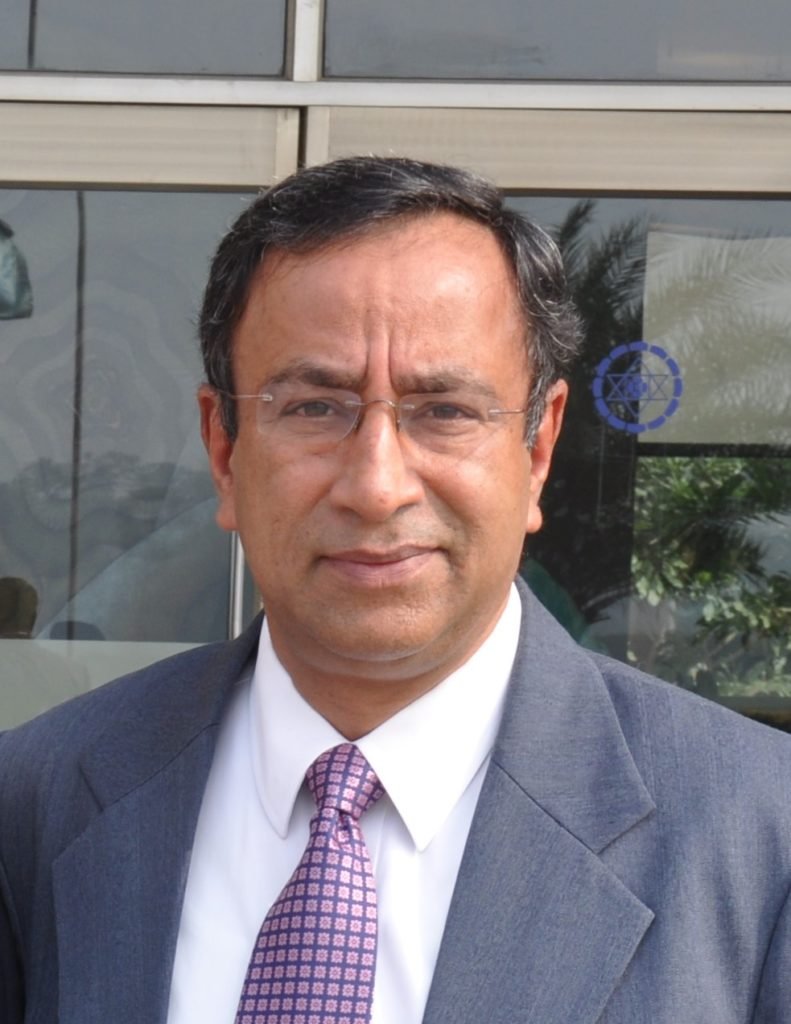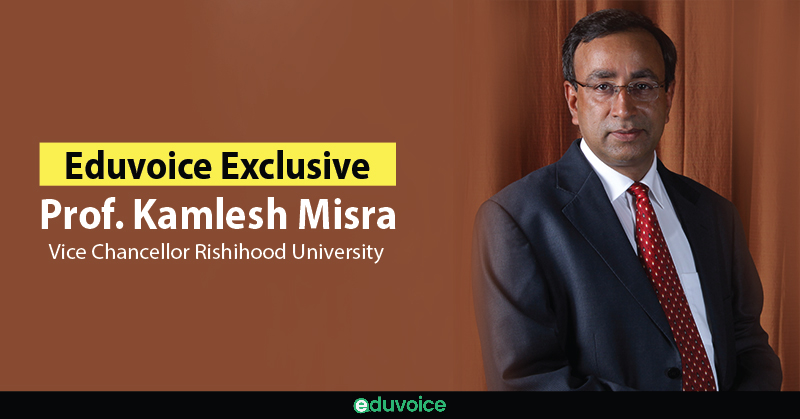Eduvoice exclusive interview

Dr. Kamlesh Misra
Vice-Chancellor, Rishihood University, Sonipat
Former Vice-Chancellor, Ansal University
Won Exceptional Educator Award: 21st Century Educational Leadership Awards-2019
introduction
Let’s do something new, something different. Let’s promote and then create research. Let’s get good people, great students, great faculty, and great illustrators.
We all are the same when it comes to rankings. We as a child, as a parent, as a teacher or in any other role, just focussed upon rankings.
Why do we want to be first?
Why are we never focussed on how much we have learned, what skills do we have?
Similarly, if we see our universities ranking, we all question their low rankings. But we need to work upon a few facts and then should sit back and wait for real results in terms of growth and innovation.
I am very grateful to Prof. Kamlesh Misra who is the Vice-Chancellor at Rishihood University, Sonipat. A lot of reasons are there for why India’s education system is lacking behind in the rankings and yes, how and what measures should be taken for the improvement of the rankings.
Let’s understand this from him.

Sujata Mehta
We all know no Indian Universities in the list of Top 200 universities in the world. In your opinion what’s the main reason behind this?

prof. misra
We can’t say that there is just one reason which is responsible for our low rankings. Ranking Parameters
All these are international rankings and the parameters are more for inclined for research, in some of them its even up to 60% to 70%. It includes information about, the number of faculty, number of publications, citations, research funds, research faculty, research centers, etc.
For instance, If the percentage of research is taken as 30 %- 50% scores for the ranking how we are going to get in top ranks?
If we have a look at the present scenario, only about 10-15% of the faculties are into research and publications. Most of our universities have funds for research neither from the government nor from industries.
But if you look at countries like the United States, most of the research is being funded by the industry or the government.
There are few good examples like Hotmail and Facebook which are an outcome of the research at a university.
What’s innovation? It’s not invention, innovation is invention plus commercialization.
The birth to the idea is given (Invention), the knowledge is created, then the industry takes and converts them into commercial products. But in India, the universities perform their role of inventions but our industry is not willing to fund research and therefore a lot of research is not coming out of universities because of lack of funds.
As a nation as well, we don’t have that much money to spend on research. Also, the government has a limited amount of money for research funds that we are putting in the Bhabha Atomic Research Centre, ISRO Space Centre, and a few others.
If there is going to be 40-45% of research for the ranking; then even if you are teaching in a good university, the rankings are not going to go high; because there is no parameter for teaching.
Parameters should be more favorable to the universities in developing countries. Almost all the parameters focus on the research and all the university rankings are calculated in the same way.
For example,
There is an issue of internationalization which is also a parameter in the universities in the ranking. The real meaning of internationalization is what is the proportion of students who come from different countries. There are approximately 1.15 Indian students who go to America, and approx. 70-80k students go to Australia and the UK.
We are receiving a lot of students so according to this internationalization, the parameter is only about 7-10% but still, they receive 7-8 points.
SUBSCRIBE TO OUR NEWSLETTER
Get latest updates about our Exclusive Interviews, News, Articles on Higher Education Sector.

Sujata Mehta
If we observe China, it has more research papers and work than us despite the fact they are very not good with global language English.

prof. misra
That’s true. Let’s understand this. They’re sending their students abroad, getting them educated and all of them are coming back. Most importantly they are all funded by the government. So, they have an advantage in this particular aspect.

Sujata Mehta
We all know this discussion is everywhere, we know we are lacking somewhere. Then what’s stopping us in its execution.

prof. misra
I think the most important thing for us is to go through the realization that research is about creating new knowledge. Our universities have to shift gears from being a disseminator of knowledge to creators of knowledge.
We are more into following the traditional methods, we are not into the creation of new knowledge. This will require a shift in our thinking as well. So, I feel that things have to change administratively.
Also, the governance structure needs to be changed.
Let’s be very honest about this, if the government is appointing Vice-Chancellors, nothing’s going to change. The government should not appoint Vice-Chancellors. There should be a committee that should appoint Vice-Chancellors. And they should be academicians rather than people who have political affiliations. This is something that needs to be changed.
Unless we bring about a change in the governance structure of the universities; where people with higher caliber get a place, this scenario will continue.
According to me one of the biggest problems that we had 30 years back was the implementation of the Mandal Commission in the university. That is the appointment of teachers in the universities, based on the reservations. Universities need to select the best people.
If you are going to have teachers who have 40-50% question marks and we reject[RM3] people with 80%- 90%, then how are we going to attain the quality of education?
Teachers have to be good to do research and, and teach well. Unfortunately, after the implementation of the Mandal commission, a lot of incompetent people had to be accommodated into the system. And that was in fact, the beginning of the decline of India’s education system.
We should bring about changes in the university structure and the recruitment policy.
Changes in university structure
We need to bring about structural change in the university. We need to open more research centers. There is the existence of the departments, but not of the research centers.
Another thing we should do is completely revamp our Ph.D. programs. Ph.D. programs are supposed to be research programs. They are not based on real research but more of the copy work.
As there are not enough facilities for labs, equipment, etc. even teachers letting their students copy-paste. Hence, a student’s Ph.D. gets completed easily and without any effort in only 2.5 years.
Focus of Character Building
There are two main areas of education: the training of the mind and character building.
Our education system is not interested in character building. Sometimes, I feel that neither the students hold that sort of thought process nor do the teachers. I can’t blame only the students. We are just after the degree.
In the US you get a degree in English literature and you can work for a company like Snapchat or Microsoft but there they’re not looking at your degree but at your skills.
Therefore, the aspect of focusing on character building needs to come in the thought process of everyone. If they have to bring about this change, it has to be a revolution.

Sujata Mehta
We’ll be grateful if you share some of your initiatives that have flourished well and have given good results, you would suggest others to implement too.

prof. misra
We need to bring a major thrust towards research and innovation.
Now what we all can do at individual levels? As Vice-Chancellors we have to take that responsibility.
For example, we are setting up this new university, the first thing that I did was that I said,
Let’s do something new, something different. Let’s promote and then create research. And so, I came up with the idea of setting up “All India Researchers Homes” at the campus.
So, what is the All India Researchers Home?
All India Researchers Home has all facilities for research, whether it be books, papers, lab services, etc. and it is open for everyone. National, international, anybody who is doing any of his/her research. You’re welcome, come and stay with us. All the services will be provided and once you are doing that research, based on the outcome of that research, you may also be given a couple of lectures. These lectures should be in all the universities in India. It is all about knowledge and sharing knowledge, sharing as much as you can. So that is an initiative from my side.
The tragedy of all times is that no one wants to do a Ph.D. for knowledge and research, they want to do it for the jobs.
There are some examples as well which provide the US level Ph.D.; like IIT Delhi. There it is impossible to complete the Ph.D. in 2.5 years. The coursework is only done until the period time of 1.5 years, then 3-4 comprehensive exams will take place.
So, that’s how we have to bring about some changes, it will proceed slowly. But I think it’s the change in the mindset which is more important. It is not about that if we change the way of doing the tasks, everything will be fine.
It’s like when we talk about bringing reforms in India, what sort of changes and reforms will you be able to bring in if you can’t change the mindset of the people.
So, we need to bring about a change in the mindset of the people that education needs to change. Education needs to be improved.
Research should be authentic, good people should come, international factors should come, pay a good salary, give good facilities; all of this will lead us with a tremendous increase and improvement in the rankings in the next ten years.

Sujata Mehta
Somehow, we all are in the competition with each other for getting the best ranks ranking either on a global or the national level. But yes! we are into it, so do you think that it is hampering the quality of the education?

prof. misra
Let’s look at the rankings in two separate phases. One is what we call the international ranking and the other, we have the national ranking.
Our rankings are highly commercial. So, I think it’s great, for the student’s community. If you’re not ready for the ranking, there is a competition to get ranked. It is the competition of being at the top of the ranking and it is considered as a marketing tool. It has no meaning for the quality.
Cyber madness is one process on the internet-based research. A lot of information is available online. Some information is gathered by the people who are doing the ranking, somehow. They are more authentic.
Certainly, it cannot be 100% authentic, but I think to a large extent they reflect reality.
I believe that if we look at the rankings that are done in India, unfortunately, there is no verification of anything. We have to do rankings in a very scientific way, the cost is very high.
Many institutes speak up about being world-class, how can they be world-class, when initially it was not only in their objectives to be attained.
That’s why many times I keep on telling you that every forum, please just get back to the basics of higher education. The objective is not to become world-class but let’s focus on making a good university, and that also will take us 20-25 years.
Let’s work on them. Let’s get good people, great students, great faculty, and great illustrators.
For More Such Articles, News Update, Events, and Many More Click Here





